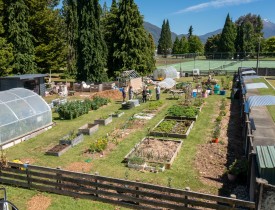
A new Mental Wellbeing Navigator is proving vital in
providing clear pathways to mental health services available
within the Central Lakes community, identifying critical gaps
and working to connect services to those in need.
Lisa Gear, a nurse with 30 years’ experience and a passion
for family support and perinatal care, was appointed to
the role in March 2021. Based out of Central Lakes Family
Services in Queenstown, she sits alongside new and
existing clinical roles and acts as a main point of contact
to streamline services and help co-ordinate the region’s
mental wellbeing response.
Funding the role for the next two years has been a
collaborative effort, with Community Trust South
contributing $10,000, along with funding from Central
Lakes Trust, Lotteries and Wakatipu Community Foundation
- Greatest Needs Fund.
The Mental Wellbeing Navigator role was identified and set
up by the Te Hau Toka Southern Lakes Wellbeing Group in
direct response to community-wide mental health impacts
being seen as a result of COVID-19. The group, comprising
Southern DHB, WellSouth Primary Health Network,
Queenstown Lakes District Council, Central Lakes Family
Services and Tahuna-Whakatipu Māori Community, was
formed in June 2020. It uses its extensive professional and
personal networks to help co-ordinate an overall picture of
ongoing needs which includes sharing wellbeing concerns,
monitoring service capacity and working together on ways
to tackle the mental wellbeing effects in communities.
Lisa’s first task has been identifying and connecting with
organisations and groups within the Central Lakes region
that offer mental health services and programmes. Five
high risk areas have initially been identified - new and
expectant parents, migrant communities, businesses,
children and youth, and older persons. “There’s a huge
need in the community and some amazing people and
organisations delivering great programmes and initiatives
here so I’m building a directory of services to create clear
pathways to match them up.”
“Staffing, resources, high demand for services, inequities,
and misinformation or mistrust around accessing services
are all issues we’re grappling with but in some cases,
there are simple solutions and I can see that clear
communication and working collaboratively is already
making an impact.”
“The navigator role is proving to be key in connecting
services to people and connecting organisations and
agencies. By harnessing the collective knowledge,
expertise, experience and values of our healthcare
agencies and affected communities, we have a great
opportunity to work on ‘for the community, by the
community’ solutions to support wellbeing.” Lisa Gear –
Mental Wellbeing Navigator.


